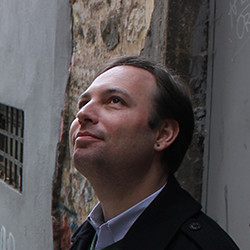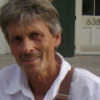Marlin M. Jenkins
When I give him that look, he asks why I think it’s weird for him to rap along with the radio. He looks back at his game on the TV as I shake my head, place my hand on his shoulder. We were the first in school to begin to grow beards. We will order pizza with halal pepperoni; he will ask about my mother, what it was like for her to re-marry. My mother has not made Arabic food since she converted and met her husband at church. His mother rolls grape leaves on the front porch, wet like his gelled hair. She whispers to the neighbors. When he asks his questions, he stares into the hybridity in my arteries. I stare at the hair on his arms, compare the tight curls on my head, the curve of his nose.
 Marlin M. Jenkins was born and raised in Detroit, graduated from Saginaw Valley State University in Michigan, and will be attending University of Michigan’s MFA program this fall. His writings have found homes in River Styx, Yemassee, and Midwestern Gothic, among others. You can find him online at marlinmjenkins.tumblr.com and @Marlin_Poet.
Marlin M. Jenkins was born and raised in Detroit, graduated from Saginaw Valley State University in Michigan, and will be attending University of Michigan’s MFA program this fall. His writings have found homes in River Styx, Yemassee, and Midwestern Gothic, among others. You can find him online at marlinmjenkins.tumblr.com and @Marlin_Poet.


 Abhijit Sarmah is a Masters in English student at the University of Dibrugarh, Assam, in India. He wrote a chapbook, The Voice Under Silence, in 2016.
Abhijit Sarmah is a Masters in English student at the University of Dibrugarh, Assam, in India. He wrote a chapbook, The Voice Under Silence, in 2016.


